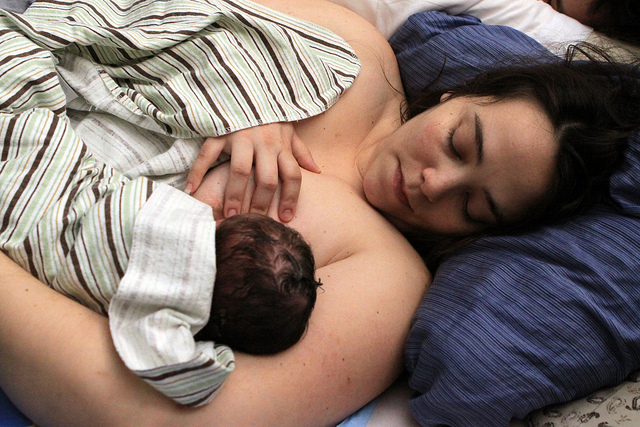The Size of This Baby Highlights the Growing Super-Sized Baby Trend
By:
A Melbourne, Australia mother, Natashia Corrigan, welcomed a new child into the family in a big way in January, giving birth to a 13.25 pound son. According to Australian 7 News, nursing staff at the hospital say Brian Jr. is double the size of an average Australian newborn. (For perspective, the average birth weight for newborns in the United States is just under 7.5 pounds, according to USA Today.)
But here's the kicker: Corrigan delivered her baby without an epidural — the most common form of anesthetic administered during child birth. In fact, the only pain relief Corrigan received during delivery was laughing gas, according to BuzzFeed.
"It was a bit hard to get him out,” Natashia told Herald Sun, in a laughable understatement.
But Brian Jr. isn't as unique as we might think.
Corrigan's delivery is a perfect example of an alarming trend in infant birth weights. Macrosomia — the condition given to any birth over 8 pounds 13 ounces — is on the rise. Examples of massive newborns abound. And having your baby born at a higher-than-normal weight can lead to adverse outcomes for mothers and infants alike. According to the Mayo Clinic, "Fetal macrosomia may complicate vaginal delivery and could put the baby at risk of injury during birth. Fetal macrosomia also puts the baby at increased risk of health problems after birth."
 Lindsey Turner - flickr.com
Lindsey Turner - flickr.com
And yet, the average U.S. infant is getting smaller.
Confusingly, however, the average birth weight in the U.S. appears to be declining. According to USA Today, "...newborns were a bit lighter in 2005 than in 1990, ending a half-century of rising birth weights." Basically, while on average, babies are getting smaller, those on the higher end of the spectrum keep getting larger.
"What physicians are responding to is that the bigger babies are getting bigger," Dr. Emily Oken, a lead researcher on a study into infant birth weights at Harvard Medical School, told USA Today.
Why are big babies getting bigger?
 Sandra Cohen-Rose and Colin Rose Follow - flickr.com
Sandra Cohen-Rose and Colin Rose Follow - flickr.com
It's pretty simple, actually. Larger mothers tend to produce larger babies, according to this August 2012 study. And, in the United States of America, mothers are getting larger. Obesity is on the rise, for a whole host of reasons. Thus, even if the average American birth weight is decreasing, it's possible that at the higher end of the spectrum babies are being born bigger.
According to the Huffington Post, the Institute of Medicine's guidelines state that overweight mothers should gain no more than 25 pounds during their pregnancy, and obese mothers should gain no more than 20 pounds.
And according to a 2011 study published by the American Journal of Health Promotion, overweight babies are more likely to become overweight adults. So unless the U.S. is able to address its obesity problem, it's possible these big babies will become tomorrow's big mothers.
